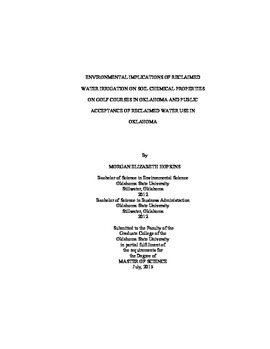| dc.description.abstract | Golf course managers in arid and semi-arid regions of the United States are increasingly using reclaimed water for irrigation as freshwater supplies are decreasing due to drought and rapid population growth. Many municipalities are considering implementation of reclaimed water into regional water plans, for which public acceptance is a key factor in the success. The first objective of this research was to assess how reclaimed water irrigation affects soil chemical properties compared to other irrigation sources, including treated municipal water, untreated surface water, and groundwater on five golf courses in Oklahoma. A total of 90 samples from six holes on the greens, fairways, and irrigated roughs were taken along with irrigation water samples and analyzed. High levels of total soluble salts (~3000-3673 mg L-1) were found in soils irrigated with untreated surface, reclaimed, and ground waters. Elevated and deficient levels of nutrients (Ca, Mg, NO3, P, K, Fe, Cu, Zn, SO4, Mn, and B) were found in the soil and water samples on all of the five courses in the case study. Reclaimed water can be effectively utilized for golf course irrigation if combined with regular soil and water quality monitoring and proper best management practices. The second objective of this research was to investigate Oklahomans� willingness to pay for reclaimed water as municipal supply as a hedge against drought driven shortages. An Internet survey of 486 Oklahomans indicated that respondents were willing to pay for an additional fee on the standard price charged for water per 1000 gallons. Factors that influence this public acceptance and willingness to pay include: being male; have an annual income of $20,000-100,000+; rent their home; support reclaimed water use policy; and believe reclaimed water is not hazardous. Survey respondents were willing to pay an average fee of $4.19 and $4.20 per 1000 gallons. Providing basic educational information about the safety and quality of reclaimed water will help Oklahomans understand and accept reclaimed water use. Results of this research should aid golf course managers and municipalities interested in using reclaimed water for irrigation purposes, or to integrate reclaimed water use into regional water plans. | |
